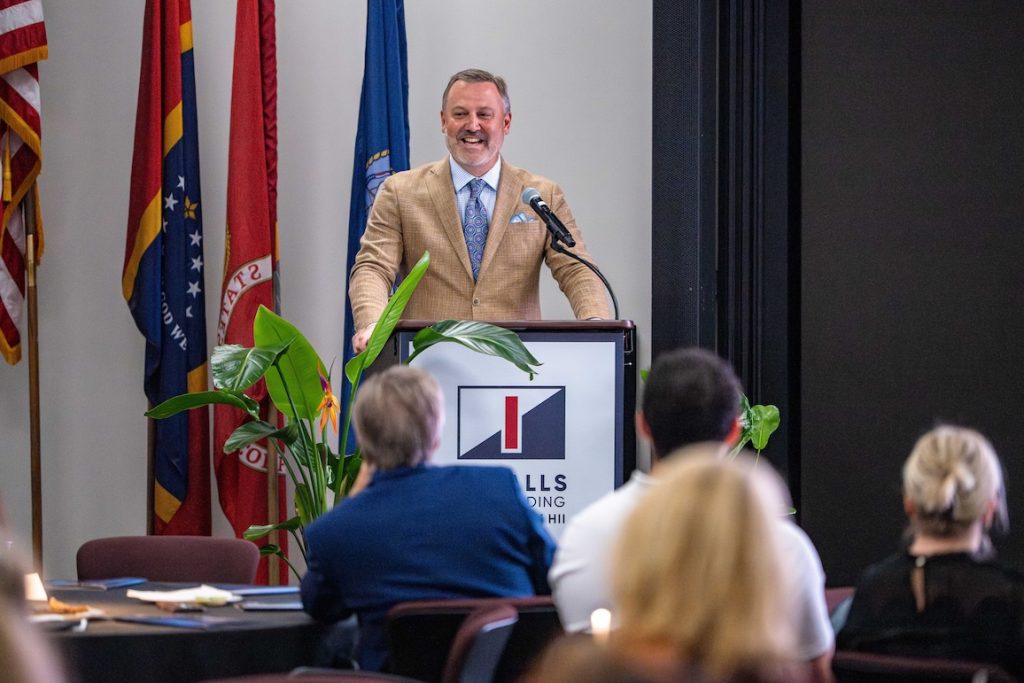On August 28, more than 120 Gulf Coast Business Council members gathered at Ingalls Shipbuilding in Pascagoula for our Monthly General Membership Meeting. The event brought together legislators, mayors, and business leaders for timely conversations about the Coast’s economy, long-term planning, and the policies that will shape our state’s future.
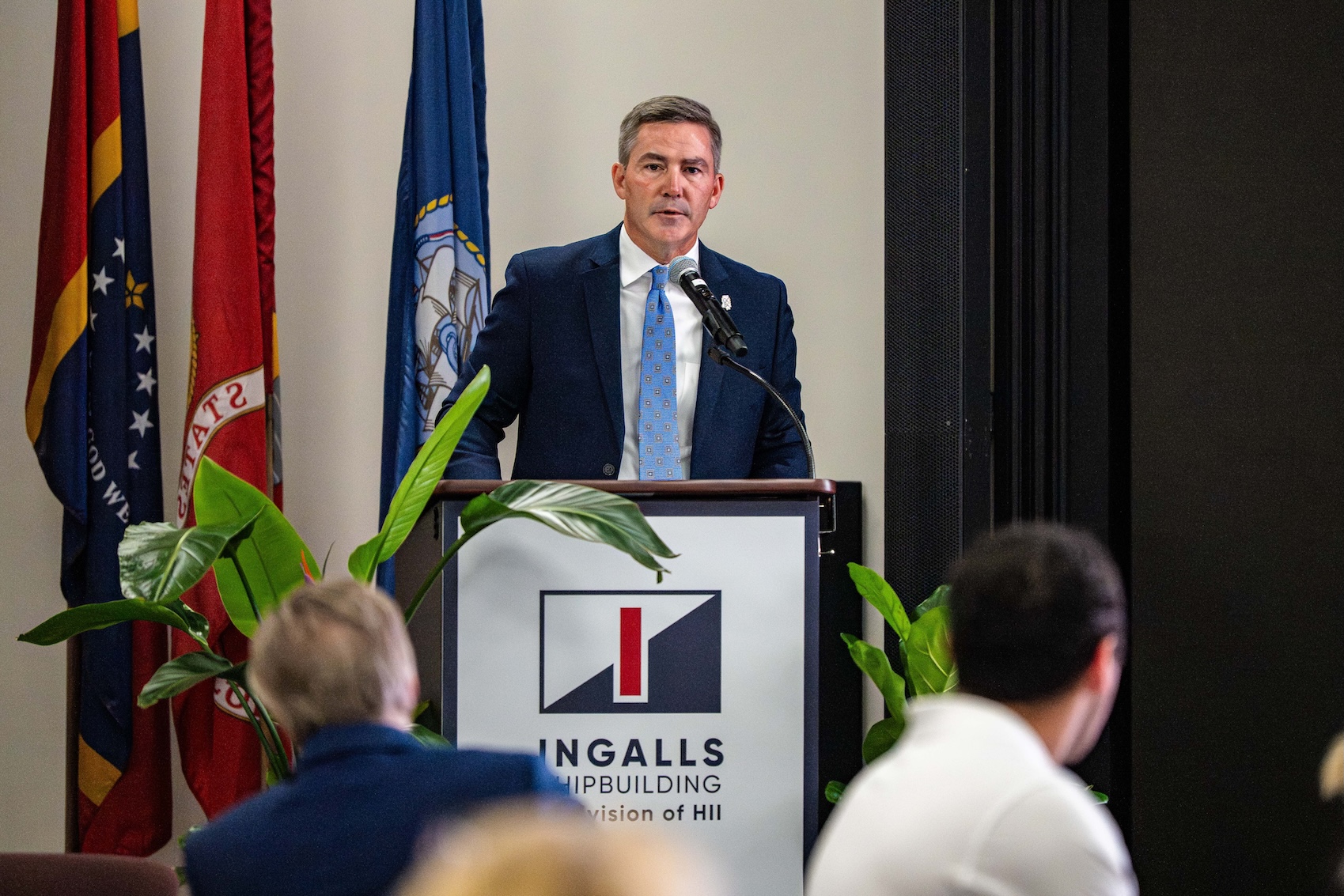
Welcome from GCBC and Ingalls
GCBC President & CEO Jamie Miller opened the program by acknowledging the many elected officials in attendance, including members of the Mississippi House, coastal mayors, and other civic leaders. He then introduced Ingalls Shipbuilding President Brian Blanchette.
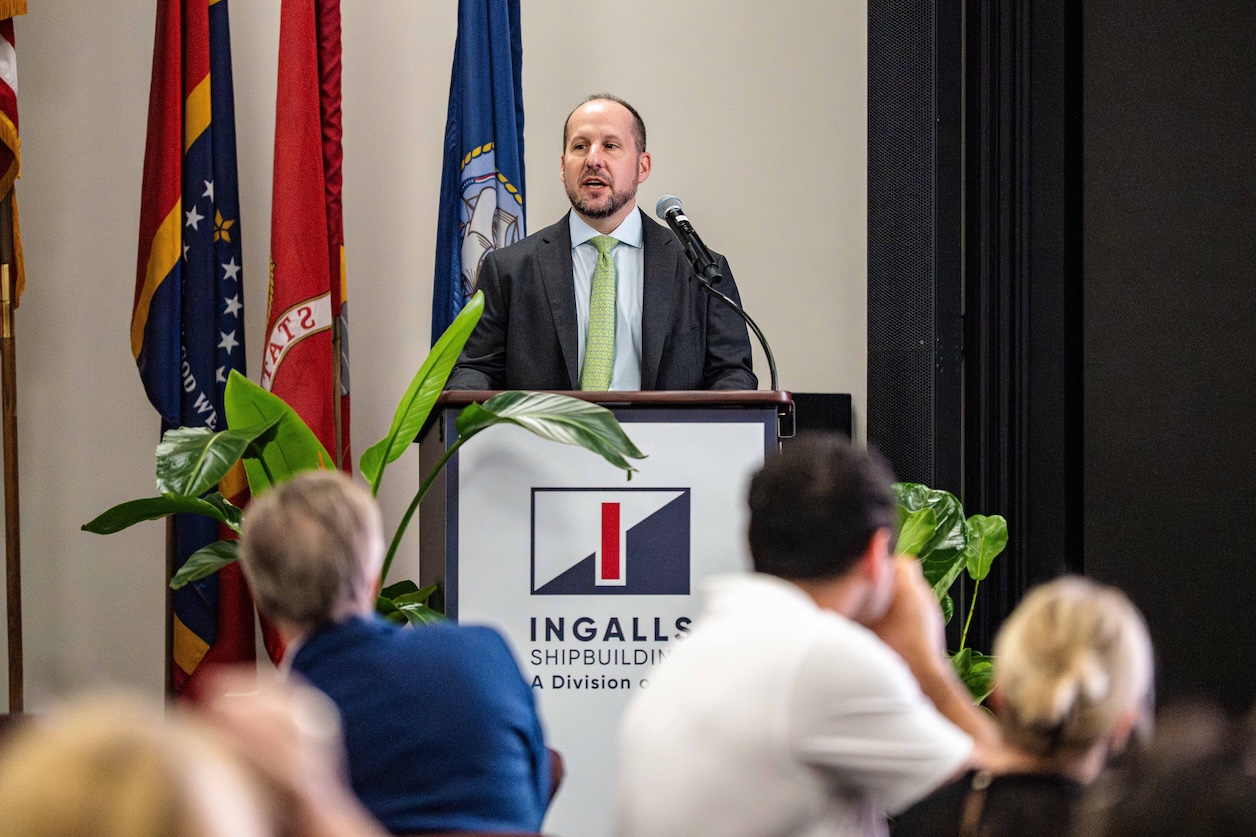
Blanchette, who welcomed members to the Pascagoula shipyard. Guests were shown a moving, never published publicly Ingalls video documenting the shipyard’s recovery after Hurricane Katrina, offering a powerful reminder of the Coast’s resilience.

Refocusing on Long-Term Priorities
Miller also spoke about the importance of taking this moment to step back and reflect on the guiding principles outlined in the TIP Strategies report, which continue to provide a strong framework for the Coast’s long-term growth. He emphasized that GCBC will be highlighting projects that align with those principles and demonstrate the kind of transformational impact our economy needs.
Speaker of the House Jason White
The keynote speaker was Speaker of the Mississippi House of Representatives, Jason White. Jamie introduced Speaker White by sharing his background: a native of Kosciusko, a law school graduate, and a former city attorney who has served in the House since 2011 and is now in his fourth term as the 62nd Speaker.
Speaker White began by offering sincere condolences to the Ingalls community following the tragic incident that occurred at the shipyard last week.
He recognized Representative Manly Barton, Speaker Pro Tempore, along with Representatives Kevin Felsher, Zach Grady, and Jimmy Fondren, and praised the Coast delegation’s “pack mentality” at the Capitol—emphasizing that they consistently work together to defend the Coast’s interests in areas like gaming, ports, and tourism.
A large portion of his address focused on the Gulf Coast Restoration Fund (GCRF). He emphasized that the GCRF must remain focused on transformational projects that generate long-term impact for the Coast, rather than smaller, scattered distributions. White also noted that perhaps the pause on funding provides an opportunity for a “reset” to ensure future allocations are aligned with the original vision of the program. Above all, he urged the business community to continue working together to bring forward projects that are truly transformational.
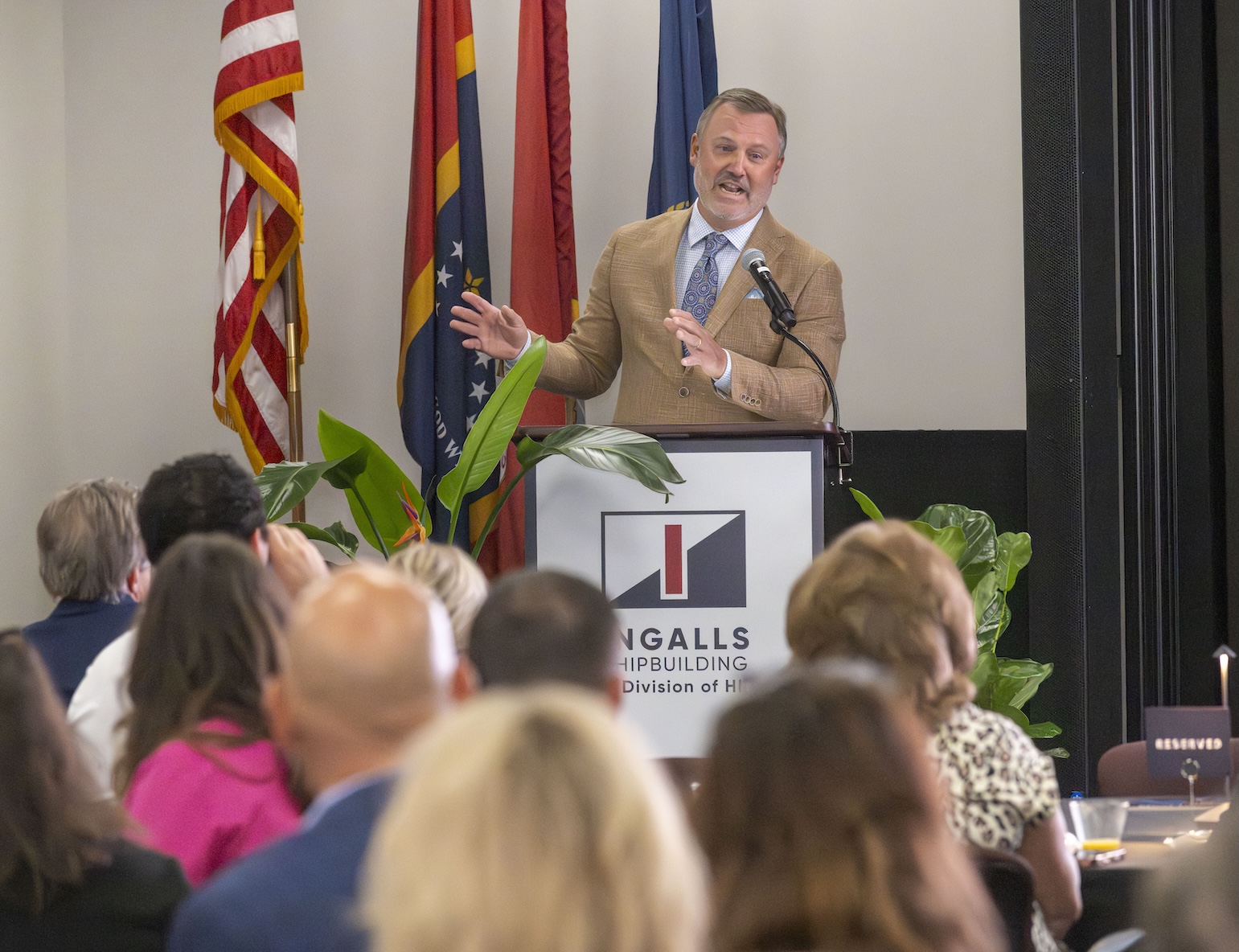
He also addressed several other major topics:
Fiscal Policy
Speaker White highlighted the Build Up Mississippi Act (House Bill 1), which set a pathway for eliminating the personal income tax and represented the largest tax cut in state history: $1.9 billion. He noted that Mississippi continues to run a $600 million tax surplus and that the House is committed to responsible stewardship of taxpayer dollars, preferring citizens keep their money rather than see it absorbed by government spending. He also pointed to future priorities, including lowering the state’s grocery tax, which remains one of the highest in the nation.
Retirement
He spoke candidly about the Public Employees’ Retirement System (PERS), acknowledging it as a tough conversation that leaders must continue to confront. With many retirees, including his own family members, dependent on the program, White emphasized the need for a sustainable long-term path.
Education
Speaker White celebrated that Mississippi’s new K-12 education funding formula has now been fully funded for two consecutive years, something the previous formula only achieved twice in nearly three decades. He praised the strength of schools on the Coast and the culture of choice that allows families to pursue the best educational options. He emphasized that competition among schools lifts everyone up, and that education should remain the state’s most powerful equalizer.
Healthcare and Equity
In response to questions about Mississippi’s infant mortality rate, White acknowledged the challenges posed by poverty, a shortage of doctors in rural areas, and broader socioeconomic factors. He noted recent efforts such as the rural doctor incentive program but stressed that more must be done to address these disparities.
Speaker White concluded his remarks by stressing the importance of keeping the Coast front and center in state policy and thanking GCBC members for their leadership. We extend our thanks to him for making the trip from Jackson to speak with our members.
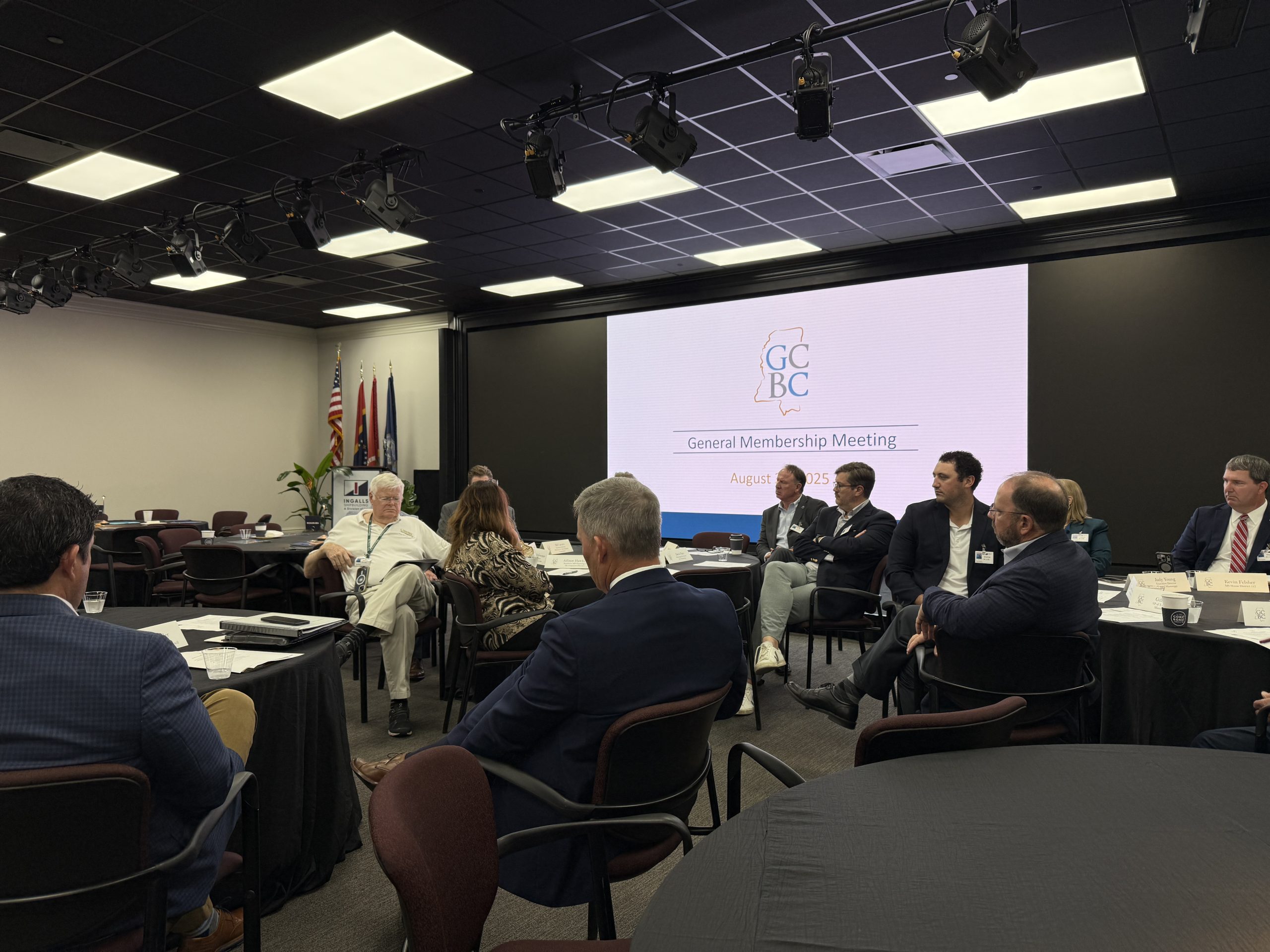
Business Leader Roundtable with State Leadership
Following the general meeting, Speaker White, several House members, and select Coast leaders participated in a private roundtable discussion to dive deeper into regional priorities. The conversation underscored both the opportunities and the challenges of aligning projects across the Coast’s diverse counties.
Judy Young, Chief Executive Officer of Coastal Mississippi Tourism, highlighted the need to address the aging Mississippi Coast Coliseum, which is now 50 years old and vital to regional tourism.
Blaine LaFontaine, Executive Director of the Hancock County Port & Harbor Commission, spoke about the importance of advancing hangar development at Stennis to support site readiness and aerospace growth.
Bo Ethridge, Port Director at Port of Pascagoula, noted the extraordinary growth the port has experienced—handling 100 new vessels in the past two years—despite limited capital investment. He stressed the need for more awareness of the port’s critical role, both locally and in Jackson.
Allison Beasley Hawkins, Economic/Workforce Development Division Director of the Southern Mississippi Planning & Development District, called for a focus on truly transformational projects, rather than maintenance-driven investments, pointing to the Mississippi Cyber and Technology Center as an example where private sector involvement ensures sustainability.
Davis Pace, President and CEO of Mississippi Enterprise for Technology (MSET), raised concerns about long-term planning for NASA’s Stennis Space Center. With funding uncertainties threatening to undermine the site’s future, he urged leaders to begin planning now for scenarios that could leave the Coast with a $70 million economic gap if federal support wanes.
Several legislators, including House Representatives Manly Barton and Kevin Felsher, discussed the idea of a revolving loan fund as a way to depoliticize GCRF allocations and ensure investments generate a return. Jamie Miller echoed that GCBC believes funding mechanisms like a revolving loan fund are exactly the kind of forward-thinking solutions needed.
The discussion also emphasized the importance of alignment. While each county’s economic ecosystem is different, participants stressed that these differences should not be mistaken for a lack of regionalism. Instead, the Coast’s unified goal is to diversify the economy, pursue real property development, and invest in quality of place to ensure that economic growth benefits the entire region.
Speaker White closed the session by encouraging the group to continue bringing forward big ideas that leverage private investment and transcend politics. He reminded everyone that while politics will always be part of the process, the GCRF has the potential to be different—if the Coast can commit to making its case with one voice.

Looking Ahead
The August meeting demonstrated the power of bringing together elected officials, business leaders, and community stakeholders to think boldly about the Coast’s future. GCBC is committed to keeping these conversations going, ensuring our region’s priorities are understood in Jackson, and helping advance transformational projects that will drive long-term prosperity across the Mississippi Gulf Coast.

